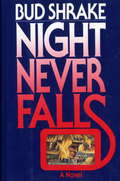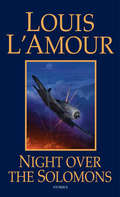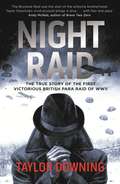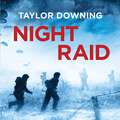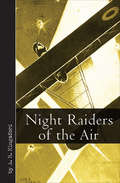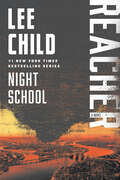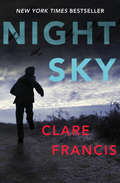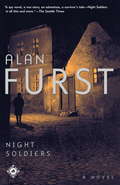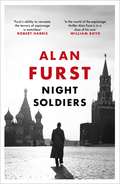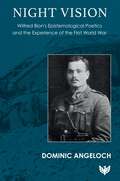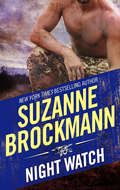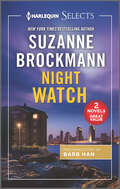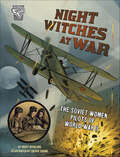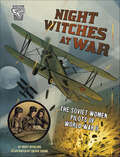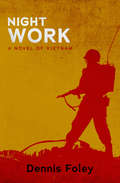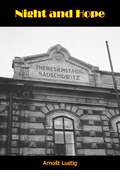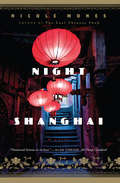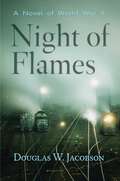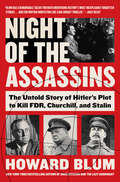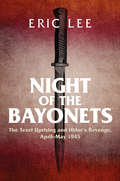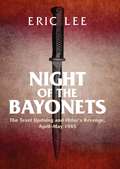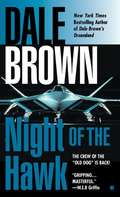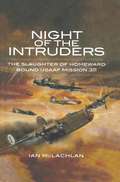- Table View
- List View
Night Letters: Inside Wartime Afghanistan
by Rob SchultheisAn account from the front lines of the Afghan civil war conveys an immediacy and describes the men, women, and children affected by the conflict.
Night Maneuvers: A Team Poseidon Novella (SEAL Brotherhood)
by Tawny WeberA SEAL seeks to protect his secrets from a reporter by seducing her in this sensual novella from a New York Times–bestselling author.Within the elite brotherhood of Navy SEALs, the Poseidon team are the very best—and the most secretive. Convincing a naive journalist not to write a tell-all PR feature should be a piece of cake for Chief Petty Officer Aaron Ward. Especially once he glimpses Bryanna Radisson’s soft, lush curves. His tactic: seduce and destroy . . . Bryanna is no pushover. Aaron’s hard-muscled body makes her crave much more than a story, and she’ll get what she came for. Desire is her weapon of choice, but when this one wild night is over, will Aaron sabotage her plans . . . or lose his heart in collateral damage?Night Maneuvers is a prequel to the Team Poseidon series.
Night Never Falls
by Edwin ShrakeHarry Sparrow, an American journalist determined to win a Pulitzer, travels to Dien Bien Phu and becomes involved with an ex-Nazi legionnaire and his girlfriend, Claudette Frontenac, in the midst of a confrontation between the French Army and a Communist force.
Night Over the Solomons
by Louis L'AmourThey're freelance pilots and full-time troubleshooters for democracy. They're men like Steven Cowan, Mike Thorne, and Turk Madden who face danger every day of their lives and fight like tigers for what they believe in. With the world on the brink of war, they're on the front lines, wherever there's action. From the dangerous South Seas islands, to steaming South American jungles, to the other islands of Japan, you'll find these man ready to fight the enemies of freedom--in a battle to the death.From the Paperback edition.
Night Raid: The True Story of the First Victorious British Para Raid of WWII
by Taylor DowningThe loss of British bombers over Occupied Europe began to reach alarming levels in 1941. Could it be that the Germans were using a sophisticated form of radar to direct their night fighters and anti-aircraft guns at the British bombers? British aerial reconnaissance discovered what seemed to be a rotating radar tower on a clifftop at Bruneval, near Le Havre. The truth must be revealed. The decision was taken to launch a daring raid on the Bruneval site to try and capture the technology for further examination. The planned airborne assault would be extremely risky. The parachute regiment had only been formed a year before on Churchill's insistence. This night raid would test the men to the extreme limits of their abilities. Night Raid tells the gripping tale of this mission from the planning stages, to the failed rehearsals when the odds seemed stacked against them, to the night of the raid itself, and the scientific secrets that were discovered thanks to the paras' precious cargo - the German radar. Its capture was of immense importance in the next stages of the war and the mission itself marked the birth of the legend of the 'Red Devils'.
Night Raid: The True Story of the First Victorious British Para Raid of WWII
by Taylor DowningThe loss of British bombers over Occupied Europe began to reach alarming levels in 1941. Could it be that the Germans were using a sophisticated form of radar to direct their night fighters and anti-aircraft guns at the British bombers? British aerial reconnaissance discovered what seemed to be a rotating radar tower on a clifftop at Bruneval, near Le Havre. The truth must be revealed. The decision was taken to launch a daring raid on the Bruneval site to try and capture the technology for further examination. The planned airborne assault would be extremely risky. The parachute regiment had only been formed a year before on Churchill's insistence. This night raid would test the men to the extreme limits of their abilities. Night Raid tells the gripping tale of this mission from the planning stages, to the failed rehearsals when the odds seemed stacked against them, to the night of the raid itself, and the scientific secrets that were discovered thanks to the paras' precious cargo - the German radar. Its capture was of immense importance in the next stages of the war and the mission itself marked the birth of the legend of the 'Red Devils'.
Night Raiders of the Air: Being The Experiences Of A Night Flying Pilot, Who Raided Hunland On Many Dark Nights During The War (Vintage Aviation Library #Vol. 20)
by A.R. KingsfordA WWI pilot’s memoir of flying with the unit that dropped the first bomb at night on Germany—and, on November 11, 1918, the last one.One of the many who came to Europe from all over the British Commonwealth to fight in the First World War, A. R. Kingsford had sailed from New Zealand in 1914. He joined the Royal Flying Corps in 1917 and learned to fly at Northolt before being posted to 33 Squadron at Lincoln, where he flew against Zeppelins sent from across the North Sea on night bombing raids. Kingsford joined 100 Squadron in France early in 1918 and had an active career with this famous squadron up until the end of the war.Full of adventure, Night Raiders of the Air is a first-person account of this young volunteer’s experiences during the Great War—a fascinating read for anyone interested in the early days of military aviation.
Night School: A Jack Reacher Novel (Jack Reacher #21)
by Lee Child#1 NEW YORK TIMES BESTSELLER • Don&’t miss the hit streaming series Reacher! &“Another timely tour de force . . . The taut thriller is textbook [Lee] Child: fast-paced and topical with a &‘ripped from the headlines&’ feel.&”—Minneapolis Star-Tribune It&’s 1996, and Reacher is still in the army. In the morning they give him a medal, and in the afternoon they send him back to school. That night he&’s off the grid. Out of sight, out of mind. Two other men are in the classroom—an FBI agent and a CIA analyst. Each is a first-rate operator, each is fresh off a big win, and each is wondering what the hell they are doing there. Then they find out: A Jihadist sleeper cell in Hamburg, Germany, has received an unexpected visitor—a Saudi courier, seeking safe haven while waiting to rendezvous with persons unknown. A CIA asset, undercover inside the cell, has overheard the courier whisper a chilling message: &“The American wants a hundred million dollars.&” For what? And who from? Reacher and his two new friends are told to find the American. Reacher recruits the best soldier he has ever worked with: Sergeant Frances Neagley. Their mission heats up in more ways than one, while always keeping their eyes on the prize: If they don&’t get their man, the world will suffer an epic act of terrorism. From Langley to Hamburg, Jalalabad to Kiev, Night School moves like a bullet through a treacherous landscape of double crosses, faked identities, and new and terrible enemies, as Reacher maneuvers inside the game and outside the law.
Night Sky: Wolf Winter And Night Sky
by Clare FrancisLove and intrigue come together against the backdrop of World War II and the struggles of the French Resistance in this international bestselling military thriller from Clare Francis Three lives, caught in the turbulence of World War II, converge one fateful night on the same beach. David Freymann, a German-Jewish scientist, has made a discovery that could free war-torn Europe, but Nazi spies and soldiers threaten world peace at every turn. Julie Lescaux, a young English mother, has moved to France and become perilously involved in the French Resistance. And Paul Vasson, a retired-pimp-turned-Nazi-collaborator, thrives in battle. Spanning a decade of war and three countries, Night Sky is the debut novel that made yachtswoman Clare Francis an international bestselling author overnight.
Night Soldiers: A Novel (Night Soldiers #1)
by Alan FurstBulgaria, 1934. A young man is murdered by the local fascists. His brother, Khristo Stoianev, is recruited into the NKVD, the Soviet secret intelligence service, and sent to Spain to serve in its civil war. Warned that he is about to become a victim of Stalin's purges, Khristo flees to Paris. Night Soldiers masterfully re-creates the European world of 1934-45: the struggle between Nazi Germany and Soviet Russia for Eastern Europe, the last desperate gaiety of the beau monde in 1937 Paris, and guerrilla operations with the French underground in 1944. Night Soldiers is a scrupulously researched panoramic novel, a work on a grand scale.From the Trade Paperback edition.
Night Soldiers: A classic spy novel of intrigue and suspense set in the Second World War
by Alan Furst'Complex, intelligent, hugely intriguing - Alan Furst is in a class of his own' William Boyd 'Furst's ability to recreate the terrors of espionage is matchless' Robert Harris'Furst never stops astounding me' Tom HanksChosen as one of the 50 Best Modern Crime Novels by Marcel Berlins, crime reviewer, The TimesBulgaria, 1934. Khristo Stoianev sees his brother kicked to death by a gang of fascist thugs. Taking a risk on the promise of Communism, he flees to Moscow and is trained as an agent of the NKVD, the Soviet secret intelligence service. His first mission is to go to Catalonia, where he is soon caught up in the bloody horrors of the Spanish Civil War. Warned that he is about to become a victim of Stalin's purges, Khristo must again take flight, this time to Paris, where he is a small player on the wrong end of a social scene that is simultaneously decadent and doomed. One of the twentieth century's greatest spy novels, Night Soldiers is a thrilling portrait of one man's extraordinary adventures and of Europe teetering on the brink of the Second World War. 'Alan Furst's mastery of the espionage novel puts him beyond any would-be rival' Literary Review 'A spy novel, a war story, an adventure, a survivor's tale - Night Soldiers is all this and more' Seattle Times
Night Vision: Wilfred Bion's Epistemological Poetics and the Experience of the First World War
by Dominic AngelochAll his life, Wilfred Bion strove to find a narrative form for the traumatic experiences he went through as a tank commander in the First World War. The body of his autobiographical and literary works documents his efforts to wrest a biography of his own from the most devastating processes of world history. As a whole, it is the result of a lifelong struggle to express something unspeakable, to restore something destroyed. What emerges is something like the prehistory of the psychical catastrophe from which Bion was unable to escape until his death. As such, however, these autobiographical fragments also reflect the prehistory of the historical catastrophe under whose spell the world still stands today. This book is the first comprehensive study of Bion's autobiographical and literary writings. Drawing on the concepts of experience and thinking developed in his theoretical and clinical works, with which they are genetically linked, it discusses Bion's strategies of writing and cognition, and for the first time systematically places a hitherto unexplored part of his work in the context of his entire oeuvre. Following the chronological thread of his life, from childhood in India through youth in England to his experience of the First World War in France and Belgium, the book traces how Bion developed his unique method of writing. Detailed narrative analyses reveal the painful work of coming to terms with the war experiences which had haunted him throughout his life - a crippling trauma whose causes extended far beyond the individual and private. The book thus provides deep insights into Bion's life, his thinking, and his writing, and offers the reader a portrait of the primal catastrophe of the twentieth century and its devastating effects.
Night Watch
by Suzanne BrockmannNew York Times and USA TODAY bestselling author Suzanne Brockmann has thrilled audiences with her Tall, Dark and Dangerous series. Experience it here with a hero who must face the most daring adventure of all--falling in love. How can he choose between an old flame and a new spark? When US Navy SEAL Chief Wes Skelly is sent to LA on assignment, he reluctantly agrees to go on a blind date with Brittany Evans, the sister-in-law of a fellow SEAL. After all, he's been secretly pining for a very unavailable woman and he needs to get over her. So what does he have to lose? Plenty, as it turns out. Because suddenly the woman he'd thought he could never have is single. However, so is Brittany--and she's in danger because of him. He knows he can keep her safe... Book 11 of Tall, Dark & Dangerous series. Originally published in 2003.
Night Watch (Tall, Dark And Dangerous Ser. #11)
by Suzanne BrockmannThe most daring adventure of allNight Watch by New York Times Bestselling Author Suzanne Brockmann US navy SEAL chief Wes Skelly has been secretly pining for a very unavailable woman for years. So when he agrees to go on a blind date with Brittany Evans, he&’s not really expecting romance. But the single mom is kind, caring and beautiful. And when Brittany is suddenly in danger, he knows he must keep her safe. Because now he has everything to lose… FREE BONUS STORY INCLUDED IN THIS VOLUME!Hard Target by USA TODAY Bestselling Author Barb Han Border Patrol agent Reed Campbell is shocked to find Emily Baker hiding out in a crate of guns smuggled into Texas. She claims she was kidnapped and held hostage by Mexico&’s most elusive drug lord, a man Reed&’s desperate to bring down. Determined to protect her, he takes her on the run, risking his life. Keeping Emily alive is a problem. Keeping his heart safe is nearly impossible.New York Times Bestselling Author Suzanne Brockmann
Night Witches at War: The Soviet Women Pilots of World War II
by Bruce BerglundFlying combat missions in wartime is always dangerous. But imagine doing so in a slow, rickety biplane, at night, with no lights or navigational equipment of any kind. Sound impossible? It wasn't for the Soviet Night Witches. This unit of incredibly brave women flew hundreds of missions to attack German forces on the front lines during World War II. Learn all about these brave women and how their skill and courage in battle helped defeat the Nazis to win the war.
Night Witches at War: The Soviet Women Pilots of World War II
by Bruce BerglundFlying combat missions in wartime is always dangerous. But imagine doing so in a slow, rickety biplane, at night, with no lights or navigational equipment of any kind. Sound impossible? It wasn't for the Soviet Night Witches. This unit of incredibly brave women flew hundreds of missions to attack German forces on the front lines during World War II. Learn all about these brave women and how their skill and courage in battle helped defeat the Nazis to win the war.
Night Work: A Novel of Vietnam (The Jim Hollister Trilogy #2)
by Dennis FoleyCaptain Jim Hollister leads his team on deadly missions through southern Vietnam in this gritty war novel from the author of Long Range Patrol.There is a little bit of Jim Hollister in all of us. Captain Jim Hollister ended his first tour of duty in Vietnam laid up in a field hospital. His most serious wounds were deep inside. Back home in America, he often woke up in the middle of the night in the grip of terrifying nightmares. But nothing—not even his long-suffering fiancée, Susan—could stop him from going back to serve his country. This time around, Jim serves as operations officer for Juliet Company, a Ranger squad with high demands placed on it to find and eliminate Viet Cong forces slipping across the Cambodian border. Fighting the enemy in the rice paddy terrain between Saigon and the border requires even more planning, training, and battlefield guile than do the tropical rain forests of the Central Highlands.Night Work brings to vivid life the courage and selfless dedication of the Army Rangers in Vietnam—and the profound costs of war.
Night and Hope (Quartet Encounters)
by Arnost Lustig George TheinerFirst published in 1962, Night and Hope is a collection of interrelated short stories by a young Czech writer who was a boy in the Terezín concentration camp near Prague during the war. They have already been received with great acclaim abroad and they now make their appearance for the first time in this country. They reveal what it was like to live in a sealed town which was in fact a reception station for the gas chambers of Auschwitz. A guard thrashes a poor old woman on the counter of her little shop and each are curiously resigned to their roles of giving and receiving degradation. Little boys play in the streets and are quietly regretful that they won’t grow up and wear fine clothes. A guard’s wife and her coffee-party friends stroll round the ghetto to collect anything that catches their eye—a wedding-ring, pathetic clothes....Arnošt Lustig’s stories are a new and vivid focus on this fearful tragedy as it affected the private individual. They are written with restraint yet nothing is glossed, and they take their place amongst the very best writing to have come out of the shambles of Hitler’s ‘Jewish Question’.“Arnošt Lustig has succeeded in putting truth into a poem. Nothing in art could mean more than that. His style is sober and modern, his sentence carries all attributes of that which connects prose with poetry and makes it obvious how slight and unperceivable the borderlines between genres.”—L. Askenazy, Literarni Noviny (Prague).“Each tale has a genuine unity of its own and is a small work of art in its own right. No one reading them could ever feel that they were only stories.”—The Times Literary Supplement (London).“No writer in Europe, in the East or in the West, has expressed as much truth about the time of the holocaust as Arnošt Lustig.”—Maariv (Tel Aviv).“Outstanding stories.”—The Bookman, London
Night in Shanghai: A Novel
by Nicole MonesThis novel of an American musician caught up in the dangers of 1930s China is &“historical fiction at its best&” (Alan Cheuse, NPR&’s All Things Considered). In 1936, classical pianist Thomas Greene is recruited to Shanghai to lead a jazz orchestra of fellow African American expats. After being flat broke in segregated Baltimore, he is now living in a mansion with servants of his own, the toast of a city obsessed with music, money, pleasure, and power, even as it ignores the rising winds of war. Song Yuhua is refined and educated, and has been bonded since age eighteen to Shanghai&’s most powerful crime boss in payment for her father&’s gambling debts. Outwardly submissive, she burns with rage—and risks her life spying on her master for the Communist Party. Only when Shanghai is shattered by the Japanese invasion do Song and Thomas find their way to each other. Though their union is forbidden, neither can back down from it in the turbulent years of occupation and resistance that follow. Torn between music and survival, freedom and commitment, love and world war, they are borne on an irresistible riff of melody and improvisation to Night in Shanghai&’s final, impossible choice. This stunningly researched novel that &“keeps the suspense mounting until the end&” not only tells the forgotten story of black musicians in the Chinese jazz age, but also weaves in a startling true tale of Holocaust heroism little-known in the West (Kirkus Reviews).
Night of Flames: A Novel of World War II
by Douglas W. JacobsonPainting a vivid and terrifying picture of war-torn Europe during World War II, this tale chronicles the lives of Anna, a Krakow university professor, and her husband Jan, a Polish cavalryman. After they are separated and forced to flee occupied Poland, Anna soon finds herself caught up in the Belgian Resistance, while Jan becomes embedded in British Intelligence efforts to contact the Resistance in Poland. He soon realizes that he must seize this opportunity to search for his lost wife, Anna.
Night of the Assassins: The Untold Story of Hitler's Plot to Kill FDR, Churchill, and Stalin
by Howard BlumThe New York Times bestselling author returns with a tale as riveting and suspenseful as any thriller: the true story of the Nazi plot to kill the leaders of the United States, Great Britain, and the U.S.S.R. during World War II.The mission: to kill the three most important and heavily guarded men in the world.The assassins: a specially trained team headed by the killer known as The Most Dangerous Man in Europe.The stakes: nothing less than the future of the Western world.The year is 1943 and the three Allied leaders—Franklin D. Roosevelt, Winston Churchill, and Joseph Stalin—are meeting for the first time at a top-secret conference in Tehran. But the Nazis have learned about the meeting and Hitler sees it as his last chance to turn the tide. Although the war is undoubtedly lost, the Germans believe that perhaps a new set of Allied leaders might be willing to make a more reasonable peace in its aftermath. And so a plan is devised—code name Operation Long Jump—to assassinate FDR, Churchill, and Stalin.Immediately, a highly trained, hand-picked team of Nazi commandos is assembled, trained, armed with special weapons, and parachuted into Iran. They have six days to complete the daring assignment before the statesmen will return home. With no margin for error and little time to spare, Mike Reilly, the head of FDR’s Secret Service detail—a man from a Montana silver mining town who describes himself as “an Irish cop with more muscle than brains”—must overcome his suspicions and instincts to work with a Soviet agent from the NKVD (the precursor to the KGB) to save the three most powerful men in the world.Filled with eight pages of black-and-white photographs, Night of the Assassins is a suspenseful true-life tale about an impossible mission, a ticking clock, and one man who stepped up to the challenge and prevented a world catastrophe.
Night of the Bayonets: The Texel Uprising and Hitler's Revenge, April–May 1945
by Eric LeeThis fascinating account sheds light on a little-known Nazi rebellion led by Georgian prisoners-turned-soldiers in the final days of WWII.In April of 1945, members of the Georgian Legion serving on Nazi-occupied Texel Island rose up and slaughtered their German masters. Hitler ordered reinforcements and the fighting continued well after the war’s end. In Night of the Bayonets, historian Eric Lee examines this remarkable uprising from its bloods origins to its grim conclusion. Thousands of Georgians served in the Soviet forces during World War II. Many of those who were captured were forced to either “starve or fight” wearing Wehrmacht uniforms. But once deployed to the Netherlands, the Georgian soldiers made contact with the local Communist resistance. When their moment came, the Georgians massacred some 400 German officers using knives and bayonets. Hitler’s response was swift and merciless. It was not until May 20th—12 days after the war had ended—that Canadian forces finally put an end to the slaughter.
Night of the Bayonets: The Texel Uprising and Hitler's Revenge, April–May 1945
by Lee EricIn the final days of World War II in Europe, Georgians serving in the Wehrmacht on Texel island off the Dutch coast rose up and slaughtered their German masters. Hitler ordered the island to be retaken and fighting continued for weeks, well after the war's end. The uprising had it origins in the bloody history of Georgia in the twentieth century, a history that saw the country move from German occupation, to three short years of independence, to Soviet rule after it was conquered by the Red Army in 1921. A bloody rebellion against the Soviets took place in 1924, but it remained under Russian Soviet rule. Thousands of Georgians served in the Soviet forces during World War II and among those who were captured, given the choice of &“starve or fight&”, some took up the German offer to don Wehrmacht uniforms. The loyalty of the Georgians was always in doubt, as Hitler himself suspected, and once deployed to the Netherlands, the Georgian soldiers made contact with the local Communist resistance. When the opportunity arose, the Georgians took the decision to rise up and slaughter the Germans, seizing control of the island. In just a few hours, they massacred some 400 German officers using knives and bayonets to avoid raising the alarm. An enraged Hitler learned about the mutiny and ordered the Germans to fight back, showing no mercy to either the Georgians or the Dutch civilians who hid them. It was not until 20 May, 12 days after the war had ended, that Canadian forces landed on the island and finally put an end to the slaughter. Eric Lee explores this fascinating but little known last battle of the Second World War: its origins, the incredible details of the battle and its ongoing legacy.
Night of the Hawk (Patrick McLanahan Series #3)
by Dale BrownThe exciting final flight of the "Old Dog"--a shattering mission into Lithuania, where the Soviets' past could launch a terrifying future... "Dale Brown brings us the gripping conclusion of the saga that began so memorably with Flight of the Old Dog. A masterful mix of high technology and human courage." --W.E.B. Griffin
Night of the Intruders: The Slaughter of Homeward Bound USAAF Mission 311
by Ian McLachlanThis WWII history recounts the harrowing Allied bombing mission that led to heavy losses for American pilots as German fighters followed them home. On April 22nd, 1944, Allied forces launched an audacious assault on Germany&’s largest railway marshalling yards, located in the city of Hamm. The raid resulted in ferocious aerial combat against night fighters. But the worst was yet to come for the USAAF pilots who sought the sanctuary of their own airfields. The German fighters followed the air armada home after the raid, picking individual bombers off on their return over Europe and England as the American force struggled to land. Aviation historian Ian McLahclan vividly describes the aerial combat involving many famous USAAF, RAF and Luftwaffe units. With a combination of powerful human stories and fascinating technical details, this volume chronicles the mission from the planning stage to its bloody finale, untangling what went so horribly wrong.


